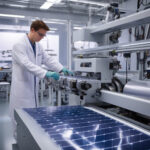Innovative Self-Cleaning Glass Developed by Chinese Scientists Using Electric Fields to Combat Dust
Scientists from the Zhejiang University in Eastern China have developed a new type of self-cleaning glass that harnesses the power of electric fields to effectively remove dust and dirt, revolutionizing the way we perceive and maintain cleanliness in our living and working spaces. This groundbreaking invention marks a significant advancement in the field of materials science and has the potential to reshape various industries, ranging from construction to automotive, with its unparalleled benefits.
Traditional glass surfaces often fall prey to dust accumulation, requiring frequent cleaning and maintenance to uphold their clarity and aesthetic appeal. However, the newly developed self-cleaning glass eliminates this hassle by utilizing electric fields to prevent dust particles from settling on its surface. This innovative approach not only ensures a consistently clear and pristine appearance but also minimizes the need for manual cleaning, saving both time and effort for individuals and businesses alike.
The technology behind this remarkable glass involves the integration of a transparent conductive layer that generates an electric field across the surface. When a voltage is applied to the glass, this electric field creates a charge imbalance that repels dust particles, preventing them from adhering to the surface. As a result, the glass remains clean and virtually maintenance-free, offering a sustainable solution for maintaining a hygienic environment.
Apart from its self-cleaning properties, the electric field-enabled glass also boasts enhanced durability and longevity compared to conventional glass products. By reducing the accumulation of dust and dirt, the glass surface is less prone to scratches and abrasions, preserving its quality and clarity over an extended period. This not only enhances the aesthetic appeal of buildings and vehicles but also contributes to cost savings by reducing the frequency of replacements and repairs.
The applications of this revolutionary self-cleaning glass are diverse and far-reaching, catering to a wide range of industries and settings. In the construction sector, buildings can benefit from lower maintenance costs and improved energy efficiency, as cleaner glass surfaces allow for better light transmission and insulation. Automotive manufacturers can also integrate this technology into car windows, ensuring optimal visibility and safety for drivers while on the road.
Moreover, the environmental implications of this innovation are noteworthy, as the reduced need for cleaning agents and water consumption aligns with sustainable practices and resource conservation efforts. By promoting a greener approach to maintenance and cleanliness, the self-cleaning glass contributes to a more eco-friendly future, where efficiency and environmental consciousness go hand in hand.
In conclusion, the development of self-cleaning glass utilizing electric fields by Chinese scientists represents a significant leap forward in the realm of material innovation. With its unparalleled cleaning capabilities, durability, and sustainability benefits, this technology is poised to transform industries and elevate standards for cleanliness and maintenance. As we witness the potential of this invention unfold, one thing is certain – the future is looking clearer and brighter through the lens of electric field-powered self-cleaning glass.
self-cleaning glass, electric fields, innovation, sustainability, materials science












